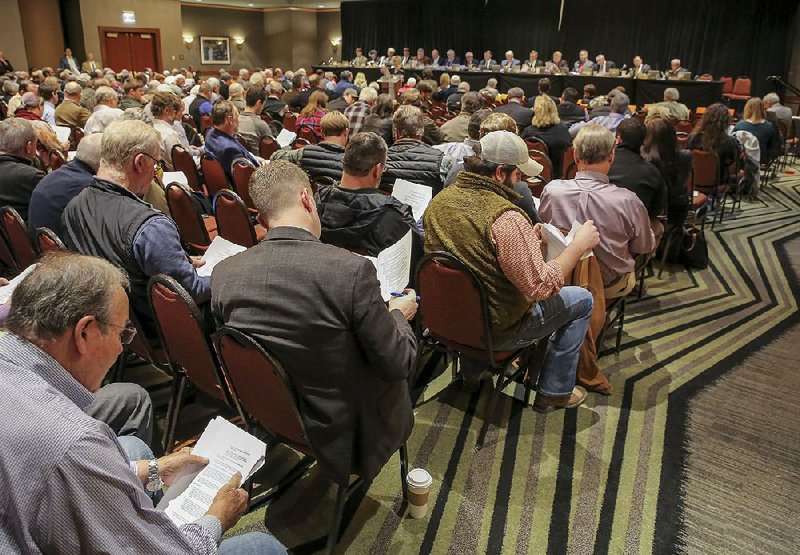Farmers will be allowed to spray dicamba on soybean and cotton crops tolerant of the herbicide through May 25, the state Plant Board voted Wednesday night.
The board, during a public hearing and board meeting that took a combined nine hours, appeared to be at a stalemate after more than a half-dozen votes on various motions and amendments failed.
"We're at a stalemate," Jerry Hyde, a board member from Paragould, said before offering the May 25 cutoff, five days past what the board was set to consider at the start of a hearing that attracted about 250 people to a ballroom at the Embassy Suites hotel in Little Rock.
Hyde's amendment on the cutoff date, and other restrictions, received nine votes, the minimum number required for passage. Six members voted against it. The board's chairman didn't vote, a normal procedure except to break a tie.
Without a change in pesticide regulations, last year's mid-April cutoff would have remained in effect.
Along with the May 25 cutoff, Hyde's amendment included these restrictions on spraying the herbicide before that date:
• A mile buffer from university and government research stations, certified organic crops and commercially grown specialty crops whose producers have more than 1,000 plants or average annual sales of more than $25,000.
• A ban on tank-mixing dicamba with glyphosate, commonly known as Monsanto's Roundup, a combination that weed scientists say increases dicamba's tendency to move off target.
• A half-mile buffer in all directions from soybeans that are not tolerant of dicamba.
• Requiring applicators to show proof they've been trained and certified to spray dicamba prior to purchase of the herbicide.
Marty Eaton, a board member from Jonesboro, helped devise some of those additional restrictions after his effort to move the cutoff date to June 1 failed.
The flurry of motions and amendments, with no copiers and other equipment available for Plant Board staff members to print amendments for closer study, led Russell Black of Fayetteville to say, "There are too many unanswered questions. The cart is way ahead of the horse. We're not ready [to vote]."
Eaton said farmers who plant dicamba-tolerant crops deserve a chance to use dicamba against pigweed now resistant to other herbicides. An April cutoff date, he said, deprives them of that chance and the May 21 cutoff restricts them, especially if a wet spring delays planting.
Last year's April 15 cutoff forced some farmers to spray illegally, Eaton said. "We don't want to push people into a corner and make a crook out of them. ... Let's compromise and get a date that everybody can live with."
Some 70 people stepped up during in the day to comment, with most supporting the April 15 cutoff.
Citing the findings of weed scientists, many said higher temperatures and humidity make dicamba more likely to lift off sprayed plants as a gas or vapor hours after application and move to susceptible crops, including fruits and vegetables, native vegetation crucial to pollination, backyard gardens and ornamentals.
Two speakers said dicamba poses a threat to their farm-to-table restaurants.
Others said it is up to manufacturers and marketers of dicamba -- Bayer, BASF, and DowDuPont -- to produce a product that won't move off target. Dozens of those in the audience, attracted to the hearing by the Audubon Arkansas conservation group, wore anti-dicamba lapel stickers.
"I've seen it kill pigweed, I've seen it kill tomatoes," Ross Wood, a certified applicator, said. "I'm not condemning the product. What I'm condemning is its trespass."
Complaints of dicamba damage have rocked row-crop agriculture, with more than 1,000 filed in 2017 and some 200 last season, even with an early cutoff. Other states face similar complaints.
Farmers who want to spray dicamba criticized buffer zones that had been proposed by board members, saying they're more restrictive than what the federal Environmental Protection Agency set in allowing in-crop dicamba's use through the 2020 growing season. The EPA set 110-foot downwind buffers between dicamba-sprayed fields and fields with susceptible crops and an additional 57-foot buffer in all directions in areas where there may be endangered species or critical habitat.
West Higginbotham, a Marianna farmer, called for a June 15 cutoff date and no buffers beyond what the EPA is requiring. "Buffers are unworkable," Higginbotham said.
The buffers ultimately approved by the Plant Board were stricter than those proposed under the May 21 cutoff.
While some farmers and representatives of Bayer and BASF criticized the work of weed scientists, a stream of others lined up to defend them, including Otis Howe, the immediate past chairman of the Plant Board, and Terry Walker, who until last year was the Plant Board's director.
Dan Scheiman, Audubon Arkansas' bird conservation director, said dicamba's use has moved from fields into communities. "This is an environmental issue, not just an agriculture issue," he said. "No matter what you decide, somebody won't be satisfied."
Just before opening the hearing to public comments, the board voted unanimously not to disqualify two of its members from participating in the meeting. Two farmers had alleged the two had conflicts of interest and sought their recusal or disqualification.
The board's latest recommendations still must be reviewed by two legislative committees, which likely will happen next week, and by Gov. Asa Hutchinson.
A Section on 02/21/2019
